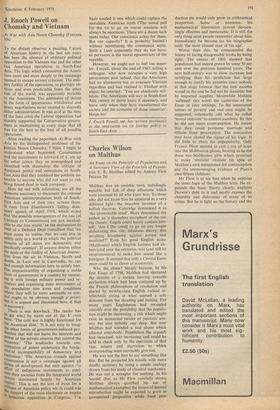J. Enoch Powell on Chomsky and Vietnam
To the distant observer a puzzling f:ature of American history in the last ten years has been the absence of ordinary political opposition to the Vietnam war and the other vast American operations in South-East Asia. The logic which committed the Ameri- cans more and more deeply to the campaign seemed to escape serious criticism. The mili- tary futility of the operations, so glaringly ob- vious and even predictable from the other side of the world, was apparently invisible to the Americans. The admission of defeat in the form of ignominious withdrawal and peace negotiations never seemed to discredit either administration. It was as if at the time of the Suez crisis the Labour opposition had sturdily supported the Conservative govern- ment in maintaining at every stage that all was for the best in the best of all possible operations.
After reading the paperback At War with Asia by the distinguished professor of lin- guistics Noam Chomsky, I think I begin to understand what happened. Communism and the movements to leftward of it, ate up the other critics: they so monopolised and identified with themselves the critique of American policy and operations in South- East,Asia that they rendered the position un- tenable to anyone who did not want to risk being found dead in such company.
Here set out with references, are all the elements necessary to document the colossal American misinterpretation both of South- East Asia and of their own actions there. It runs from Eisenhower's 'falling dom- inoes' speech of April 1954, which stated that 'the possible consequences of the loss [of Vietnam to Communism] are just incalcul- able to the free world,' to the declaration in 1969 of a Defence Dept consultant that 'we must come to realise that we can live in safety only in a world in which the political systems of all states are democratic and Pacifically oriented'. If anyone doubts either the scale or the futility of American destruc- tion from the air in Vietnam, North and South, in Laos and in Cambodia, he can find enough information here to satisfy him. The impracticability of organising a stable form of government in a country by saturat- • ing it with foreign military power and re- sources and organising mass movements of the population into areas and conditions Where they will be more amenable to con- trol ought to be obvious enough a priori; but it is argued and illustrated here, if that is necessary. There is one drawback. The reader has ,t0 get what he wants out of the 1%-' .rxist 4°,_re. The cold war is highly functional for the American elite.' It is not easy to imag- e other forms of government-induced pro- duction that will not harm the interests and Power of the private empires that control the economy.' The tendencies towards con- centration of power underscore the funda- mental incompatibility of democracy and capitalism.' American crusade against communism is not a campaign against all Inns of development but only against tile effort of indigenous movements to extri- sate their societies from the integrated world ,htent dominated largely by American capital.' This is not the sort of basis for a trItique of American policy wh'zh could win he support of the mass electorate or inspire tenacious opposition in Congress. ne
basis needed is one which could replace the moralistic American myth (Ile moral pull for the us to go on rescue missions will always be enormous. There are a dozen such spots today. Our conscience aches for them. But our capacity? It is probably limited') without substituting the communist myth. Such a Lasis apparently they do not have. so pervasive is the moral egocentrism of the republic.
However, we ought not to feel too super- ior. I recall, about the end of 1967, telling a colleague, who now occupies a very high government post indeed, that the Americans had no alternative but to evacuate Vietnam regardless and had realised it. Flushed with anger, he retorted : 'You are absolutely mis- taken. The Americans will stay in South-East Asia twenty or thirty years if necessary, and leave only when they have transformed the society and the economy of those countries'. Heigh-ho!
I. Enoch Powell, MP, has written previously in the SPECTATOR Oil us foreign policy in South-East Asia.


































 Previous page
Previous page